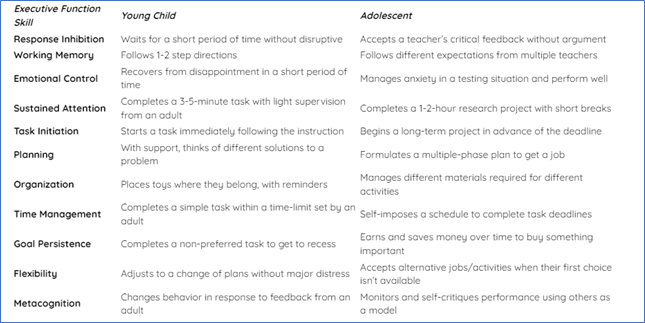By: Tonya Mead, PhD, MBA, M.Ed, School-based Psychologist

Parents, do you have a child with average cognitive abilities who seems to be in a fog all of the time; particularly when interacting in the classroom, or doing homework? Perhaps your child may have undiagnosed difficulties with executive functioning.
Executive function and your child’s brain
Parents may wonder, what is executive functioning? In the abstract, executive functioning is one’s ability to consciously manage and control one’s thoughts and actions. Executive functioning processes are located in the frontal cortex area. If one were to picture in one’s mind, a human face, the frontal cortex is the part of the brain beneath the areas between the eyebrows and up to the tip top or hair lick area of the head. A more specific area, the prefrontal cortex, controls the execution, order, and timing of sequential acts toward the accomplishment of an objective or goal. How can executive functioning be best described?
Mental skills and executive functioning
As a parent, you probably want to be provided with a real world interpretation of executive functioning. Executive functioning represents an umbrella of mental skills that helps your child (particularly in a learning environment):
1. to control (one’s instinctive impulses), inhibit (one’s behavior) or mange (delay one’s desires),
2. to identify what you want to get done (your goal or objective),
3. to think and evaluate the alternative means to achieve your objective,
4. to develop a plan for achieving your goals and objectives, and
5. to implement the plan by executing and doing what it takes to achieve your goals and objectives.
Symptoms of poor executive functioning and the brain
How would concerned parents identify poor executive functioning? Depending upon the age of your child, the symptoms may vary. Take a look at the chart posted above to get an idea of some of the ways in which poor executive functioning is manifest. f you or your child’s teacher suspect that your child has difficulties with executive functioning, you may notice at home (or the teacher may notice in the classroom) the following symptoms:
1. experiencing difficulty beginning tasks or projects on his/her own,
2. lacking motivation,
3. holding inadequate abilities to create a mental map, path of sequential steps to achieve one’s goals,
4. forgetting to start, complete or turn in homework assignments,
5. lacking the capacity to think before acting,
6. possessing inadequate ability to follow through and be persistent
7. experiencing difficulty performing complex, multi-step tasks,
8. lacking the mental stamina to sustain attention when distracted, bored, or fatigued,
9. lacking the ability to adapt to changes, challenges and barriers to one’s objectives,
10. holding insufficient abilities to reflect about one’s own thinking, and
11. lacking in the ability to cope with uncertainty and unexpected demands.
Executive functioning and environmental factors
Can environmental influencers impact efficient and effective executive functioning? Yes. The website, Choosing Therapy identified these as having the potential to negatively impact one’s ability to fully utilize one’s executive functioning abilities:
1. experiencing a traumatic event or several traumatic events in early childhood,
2. living in an unpredictable home environment or chaotic condition,
3. becoming accustomed to hyper-rewarding stimuli (social media likes, highly caffeinated and carbonated beverages, and high sugar foods, candies, and drinks), and
4. living in an impoverished and financially challenged home environment.
Other articles you might like
- Post- How to grow your child’s brain
- Post- Brain elasticity and children
- Post- Deep Brain Stimulation and children
- Post- Smartphone use, sleep and your child
- Post- Parents its ok to be predictable
- Post- Learned Optimism at Home
- Post- 15 Coronavirus Hygiene Tips for Home School Safety
- Post- 6 Tips to Avoid Home School Burnout
- Post-The Benefits of Home Schooling
- Post- Home school curriculum buying tips
- Post- Create calmness in chaos
- Post- Wanted Nanny for College Kid
Improved executive functioning recommendations
Parents may ask, “can executive functioning abilities be improved upon?” Yes, according to Harvard’s Center on the Developing Child. One way in which the mental skills related to executive functioning can be improved is with practice. How might parents help their children build these vital mental skills? Please see below a few recommendations.
1. Post a daily schedule important to the family on the refrigerator to remind parents the important school events, assignments and deadlines relevant to the lives of their children.
2. Keep a child’s clock, timer, alarm or calendar in his room to alert him to upcoming events, assignments, and pending deadlines.
3. Ask the child to identify which tasks are easy/difficult for him/her, help develop management strategies by dividing difficult tasks into separate mini tasks.
4. Maintain a visually stimulating color-coded journal or daily agenda book with stickers to track goals, objectives, steps to achieve goals and progress tracking.
5. Encourage the child to ask for help when tasks are difficult to start, maintain and complete independently.
6. Seek to reduce household clutter throughout the house and particularly in the child’s room.
7. Establish a separate student study area in the home to minimize distractions and extraneous stimuli (television, gaming devices, sporting paraphernalia).
8. Provide labeled organizers, folders, boxes and bins by subject to help your child organize tasks and assignments.
9. Encourage your child to highlight and/or underline key words, topics of reading materials and lessons.
10. Conduct daily review sessions with your child to determine (a) what he remembers about the lessons of the day, (b) key constraints, (c) areas in need of further review, (d) to chart progress or lack of progress, and to (e) items that require follow up with your child’s teacher.
Dr. Mead, PhD, MBA, MA http://www.ishareknowledge.com is a consultant specializing in human behavior, school and social psychology. She can be contacted at: tonya at ishareknowledge dot com
